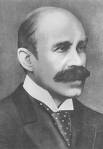
[Note: this is part of Powys' One Hundred Best Books.]

71. THOMAS HARDY. THE RETURN OF THE NATIVE.
72. THE MAYOR OF CASTERBRIDGE.
73. FAR FROM THE MADDING CROWD.
74. WESSEX POEMS.Thomas Hardy remains the greatest poet and novelist of the England of our age. His poetry, Wessex Poems, Poems of Past and Present, Time’s Laughing-Stock, Satires of Circumstance, make up the most powerful and original contribution to modern verse, produced recently, either in England or America. Not to value Hardy’s poetry as highly as all but his very greatest prose is to betray oneself as having missed the full pregnancy of his bitter and lovely wisdom.
He has, like Henry James, three “manners” or styles—the first containing such lighter, friendlier work, as “Life’s Little Ironies,” “Under a Greenwood Tree,” and “The Trumpet Major”—the second being the period of the great tragedies which assume the place, in his work, of “Hamlet,” “Lear,” “Macbeth” and “Othello,” in the work of Shakespeare—the third, of curious and imaginative interest, expresses in quite a particular way, Mr. Hardy’s own peculiar point of view. The Well-Beloved, Jude the Obscure, and the later poems would belong to this epoch.
At his best Hardy is a novelist second to none. His style has a grandeur, a distinction, a concentration, which we find neither in Balzac nor Dostoyevsky. Not to appreciate the power and beauty of his manner, when his real inspiration holds him, is to confess that the genuinely classical in style and the genuinely pagan in feeling has no meaning for you. No English writer, whether in prose or poetry, has ever caught so completely the magic of the earth and the quaint humors, tragical and laughable, of those who live inured to her moods; who live with her moroseness, her whimsicality, her vindictiveness, her austerity, her evasive grace.
Mr. Hardy’s clairvoyant feeling for Nature is, however, only the background of his work. He is no idyllic posture-monger. The march of events as they drive forward the primitive earth-born men and women of Wessex, thrills one with the same weight of accumulated fatality, as—the comparison is tedious and pedantic—the fortunes of the ill-starred houses of Argos and Thebes. One peculiarity of Mr. Hardy’s method must finally be mentioned, as giving their most characteristic quality to these formidable scenes—I mean his preference for form over color. Who can forget those desolately emphatic human protagonists silhouetted so austerely along the tops of hills and against the perspectives of long white roads?
75. JOSEPH CONRAD. CHANCE.
76. LORD JIM.
77. VICTORY.
78. YOUTH.
79. ALMAYER’S FOLLY. Published by Doubleday Page & Co. with a critical monograph, so admirably written (it is given gratis) by Wilson Follet that one longs to see more criticism from such an accomplished hand.Conrad’s work—and, considering his foreign origin and his late choice of English as a medium of expression, it is no less than an astounding achievement—is work of the very highest literary and psychological value. It is, indeed, as Mr. Follet says, only such criticism as is passionately anxious to prove for itself the true “romance of the intellect” that can hope to deal adequately with such an output. The background of Conrad’s books is primarily the sea itself; and after the sea, ships. No one has indicated the extraordinary romance of ships in the way he has done—of ships in the open sea, in the harbor, at the wharf, or driven far up some perilous tropical river.
But it is neither the sea nor the tropical recesses nor the sun-scorched river-edges of his backgrounds that make up the essence of romance in the Conrad books. This is found in nothing less than the mysterious potencies for courage and for fear, for good and for evil, of human beings themselves—of human beings isolated by some external “diablerie” which throws every feature of them into terrible and baffling relief.
The finest and deepest effects of Conrad’s art are always found when, in the process of the story, some solitary man and woman encounter each other, far from civilization, and tearing off, as it were, the mask of one another’s souls, are confronted by a deeper and more inveterate mystery—the eternal mystery of difference, which separates all men born into the world and keeps us perpetually alone. In the case of Heyst and Lena—of Flora de Barral and her Captain Anthony—of Charles and Mrs. Gould—of Aissa and Willems—of Almayer’s daughter and her Malay lover, Mr. Conrad takes up the ancient planetary theme of the loves of men and women and throws upon it a sudden, original, and singularly stimulating light; a light, that like a lantern carried down into the very Cave of the “Mothers,” throws its flickering and ambiguous rays over the large, dumb, formless shapes—the primordial motives of human hearts—which grope and fumble in that thick darkness.
The style of Conrad, simpler than that of James, less monumental than that of Hardy, has nevertheless a certain forward-driving impetus hardly less effective than these more famous mediums of expression. “Lord Jim” is perhaps his masterpiece and may be regarded as the most interesting book written recently in our language with the exception of Henry James’ “Golden Bowl.” For sheer excitement and the thrilling sensation of delayed dénouement it must be conceded that not one of our classical novelists can touch Conrad. “Victory” remains an absorbing evidence of his power of concentrating at one and the same moment our dramatic and our psychological interest.
80. WALTER PATER. MARIUS THE EPICUREAN.
[Editor's note - a discussion of Pater may be found on the next page in this list.]
© D J McAdam. Please note: all applicable material on this website is protected by law and may not be copied without express written permission.
Home | Book Collecting | Folklore / Myth | Philately | Playing Cards | Literature | Contents